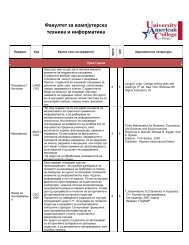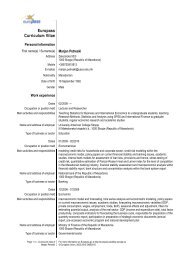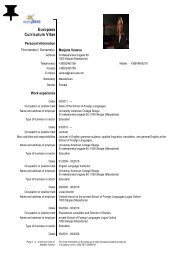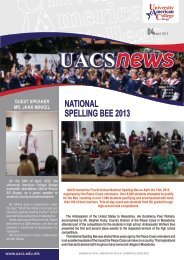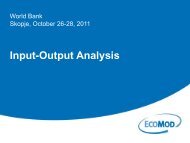UACS Collection of Abstracts 2011 - University American College ...
UACS Collection of Abstracts 2011 - University American College ...
UACS Collection of Abstracts 2011 - University American College ...
You also want an ePaper? Increase the reach of your titles
YUMPU automatically turns print PDFs into web optimized ePapers that Google loves.
KeywordsJEL classification M20, M29, D8.environments and how public policy can and should adapt all are crucialissues. Today, we are living in a chaotic transition period to a new agedefined by global competition, faster flow <strong>of</strong> information andcommunication, increasing business complexity, and pervasive globalization.The pace <strong>of</strong> change has become so rapid that it took a different type <strong>of</strong> firmsto be dominant and marked entirely new era <strong>of</strong> business. The shift toknowledge as the primary source <strong>of</strong> value makes the new economy led bythose who manage knowledge effectively – who create find, and combineknowledge into new products and services faster than their competitors.Knowledge‐based economy has created a new discipline <strong>of</strong> economics. Vastquantity <strong>of</strong> information and knowledge has been concentrated incompanies. Nowadays, each company collects and develops knowledge, andrepresents a learning organization. It is for this reason that a new disciplinehas been developed – knowledge management. The actualization <strong>of</strong> the"knowledge factor" as a solution to the general problems <strong>of</strong> economicgrowth is a very important and controversial subject <strong>of</strong> economic policies inmany countries.This paper aims to provide empirical and theoretical analyses <strong>of</strong> issuesrelating to creation and use <strong>of</strong> knowledge in the knowledge‐based economy.First, we provide some theoretical argumentations. Then, we discuss aboutknowledge policy as a main strategic tool for achieving growth andcompetitiveness in the European Union. Last, but not the least, weinvestigate the past and current situation on this matter in the Republic <strong>of</strong>Macedonia and then the paper ends with some suggestions for improving itsfuture situation.Knowledge creation, Economic growth, Management knowledge, GlobalCompetitiveness Index.Author(s)Journal <strong>of</strong> paperappearanceConference <strong>of</strong> paperappearanceTitle <strong>of</strong> the paperAbstractSnezana HristovaOman International Business Conference, <strong>College</strong> <strong>of</strong> Commerce& Economics,Sultan Qaboos <strong>University</strong>, Muscat, Sultanate <strong>of</strong> Oman, February <strong>2011</strong>An Investigation Into The New Product Life Cycle: Success Or FailureLaunching new products to market quickly and successfully is a prerequisitefor acquiring a competitive advantage. In this paper, the New productdevelopment (NPD) process has been discussed in the context <strong>of</strong> weighingand predicting the success in innovation and development <strong>of</strong> new products,as well as delivering the appropriate strategy for the product life cycle. Themain question <strong>of</strong> this research paper is what makes a new productsuccessful. It provides a vital insight into the factors that separate successfrom the failure <strong>of</strong> the innovated products. Therefore, it reviews the findings<strong>of</strong> theoretical and empirical work into the success factors <strong>of</strong> new productdevelopment. It is the prime objective <strong>of</strong> this paper to summarize the mostimportant findings in a compact and structured way. In addition,shortcomings <strong>of</strong> previous empirical work on NPD success factors will be41


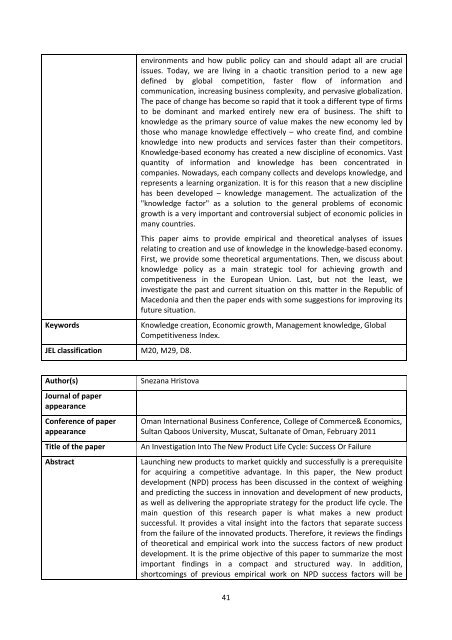
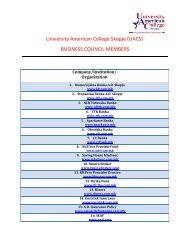



![amerikan kolex ]e bide prv univerzitet od treta generacija vo ...](https://img.yumpu.com/47278343/1/190x252/amerikan-kolex-e-bide-prv-univerzitet-od-treta-generacija-vo-.jpg?quality=85)

